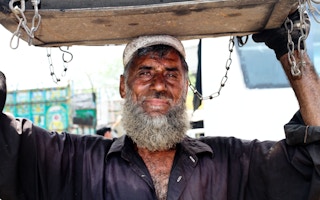Why are all countries complicit?
Nearly two thirds of forced labour cases are connected to global supply chains.
G20 countries import US$468 billion worth of goods in sectors with high risks of forced labour, including electronics, garments, palm oil, solar panels and textiles.
The global clothing industry has doubled in size in 15 years, spurred by the growth of fast fashion - cheap clothes whose swift turnaround and low profit margins increases the risks of labour abuses among garment workers.
Modern slavery has also permeated the tech sector, from the manufacturing of devices to data processing by overseas workforces.
Food industries tainted by forced labour include seafood, beef and chocolate.
What are the links between climate change and slavery?
Millions of people are uprooted by climate-related disasters every year.
People fleeing cyclones, droughts and rising sea levels are more vulnerable to exploitation due to loss of livelihoods, disrupted social networks and increased food insecurity.
In the Horn of Africa, there have been reports of rising child marriage in drought-affected areas.
Modern slavery has been connected to industries which contribute to climate change - like charcoal, cattle, and palm oil - with workers in debt bondage used to clear forests.
Renewable energy industries are also implicated. An estimated 45 per cent of the world’s polysilicon - used in making solar panels - originates in Xinjiang, raising fears over the use of forced Uyghur labour.
How did Covid-19 exacerbate slavery?
Job losses, spiralling debts and limited government support left many people worldwide easy prey for traffickers. School closures and increased poverty also fueled child marriage.
Around the world, migrant workers were left stranded far from home or in foreign countries after losing their jobs, putting them at risk of exploitation.
Some international fashion brands refused to pay for orders already manufactured, leading to increased exploitation of garment workers in Asia and elsewhere.
In Gulf countries, there were reports of wage theft from migrant workers in the construction, manufacturing and hospitality sectors.
What are countries doing to tackle modern slavery?
Britain became the first country in 2015 to introduce a Modern Slavery Act, which requires big businesses to report annually on their anti-slavery efforts.
Australia followed suit in 2018 and Canada is planning similar legislation.
Germany, the Netherlands and France have gone further by obliging companies to take action to investigate their supply chains.
Some countries have imposed controls to prevent the import of goods produced by forced labour, an example being the United States’ 2021 Uyghur Forced Labour Prevention Act.
However, progress in wealthier countries has generally stagnated.
Positive developments elsewhere include Uzbekistan ending state-imposed forced labour in its cotton picking harvest in 2021 and the Republic of Congo criminalising trafficking in 2019.
Among Gulf countries, Oman, Qatar and Saudi Arabia have adopted reforms to the kafala system, but Walk Free cautioned they were often not fully implemented.
What should countries be doing?
The increase in modern slavery comes nearly a decade after world leaders committed to ending the scourge by 2030 as part of the UN sustainable development goals.
Walk Free called for countries to urgently turn commitments into action.
Recommendations include:
- Ramping up efforts to raise awareness of modern slavery, train police, instigate investigations and ensure migrants know their rights.
- Enacting import controls on products linked to forced labour and creating public lists of companies tolerating it in their supply chains.
- Embedding action to tackle modern slavery in responses to crises like conflicts.
- Boosting primary and secondary education, especially for girls, which would reduce child marriage and child labour.
This story was published with permission from Thomson Reuters Foundation, the charitable arm of Thomson Reuters, that covers humanitarian news, climate change, resilience, women’s rights, trafficking and property rights. Visit https://www.context.news/.










